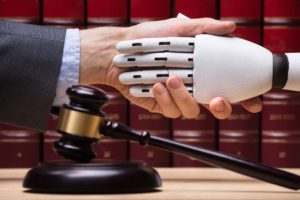The exponential growth in data over the past decade has impacted the legal industry; both requiring automated solutions for the cost effective and efficient management of the volume and variety of big (legal) data; and, enabling artificial intelligence techniques based on machine learning for the analysis of that data. While many legal practitioners focus on specific services niches, the impact of AI in the law is much broader than individual niches. While AI systems and concerns for their ethical operation are not new, the scale of impact and adoption of AI systems in legal practice makes consideration of the ethics of these systems timely. While there has been recent progress in development of ethical guidelines for AI systems, much of this is targeted at the developers of these systems in general, or the actions of these AI systems as autonomous entities, rather than in the legal practice context. Much of the ethical guidance – whether for AI systems or legal professional is captured in high level principles within more narrowly defined domains, more specific guidance may be appropriate to identify and assess ethical risks. As adoption and operation of AI software in routine legal practice becomes more commonplace, more detailed guidance on assessing the scope and scale of ethical risks is needed.

AI in the Law – Photo Credit: Adobe Stock
To hire Dr. Steven Wright for consulting services or to keynote, moderate, or host your next event please email: Dr Steven A Wright


Please note: I reserve the right to delete comments that are offensive or off-topic.